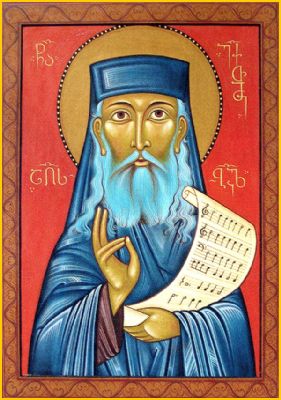|
|||
|---|---|---|---|
| This weekly bulletin insert complements the curriculum published by the Department of Christian Education of the Orthodox Church in America. This and many other Christian Education resources are available at http://dce.oca.org. | |||

The Church remembers the Abbot and Confessor Ekvtime (or Euthymius) Kereselidze of Georgia, who had a special love for the liturgical music of the Georgian Church. He did his most important work of saving that music during the terrible years of Communist domination in his home country. Born in a small Georgian village in 1865, Evstate (his birth name) was raised by Christian parents. But conditions in the village were harsh and unpromising, so when he was fifteen, Evstate went to the capital city of Tbilisi to find work. There he met other young people who shared his love of the music of the Church. They also had a common desire to strengthen the Georgian people in their understanding of the Church's teachings. For the next several years they worked together to publish and distribute various theological texts. By 1912 Evstate was ready to make a profound change in his life, actually something that had been in his heart and mind for many years. He went to the Gelati Monastery, a center of prayer and learning near the town of Kutaisi. The monastery had been built in the 11th century by the beloved Georgian King David, known as "the Builder." When 1912 ended, Evstate had completed his time as a novice, and then had been tonsured a monk by the monastery's abbot. He was given the name "Ekvtime." The next year he was ordained to the diaconate, and in 1917 to the priesthood. But 1917 brought great trouble to the Georgian Church, as the power of the Communists grew. They became especially influential in Kutaisi, and in 1924 they burned down the cathedral there, killing the Metropolitan of Kutaisi and the priests who served with him. All clergy were suspect, and everyone was in danger. As people tried to flee to the capital, they killed thousands on the road between Kutaisi and Tbilisi. Fr. Ekvtime himself was arrested but later released for lack of evidence. He was determined to preserve the ancient manuscripts of hymns he had been working on, transcribing them to Western musical notation. Hiding them in a cart, he managed to get them safely to a town near Tbilisi. Later, as the Communists continued to murder clergy and obliterate churches, he guarded the treasured documents, knowing they too would have been destroyed if they had fallen into Communist hands. A priceless part of the Church's tradition of worship would have been lost forever. In 1929, Fr. Ekvtime moved to Zedazeni Monastery, and there he concealed the manuscripts in metal containers, burying them underground. Six years later he gave the documents, containing almost 6000 liturgical chants and songs, to Georgia's State Museum. By 1944 he was exhausted from his labors and from the fear and distress caused by ongoing persecution of the Church. He died that year. Psalm 81 urges us to "sing aloud to God our strength." Fr. Ekvtime preserved the Georgian Church's musical heritage so that its people could continue to sing to Him. |
|||
